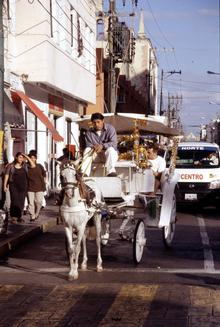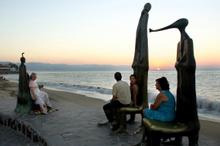
|  |  |  Puerto Vallarta Real Estate | September 2008 Puerto Vallarta Real Estate | September 2008  
US Retirees Flock South of the Border
 Jeremy Schwartz - Cox News Service Jeremy Schwartz - Cox News Service
go to original


| | A driver maneuvers his horse and carriage through the traffic of bustling Merida, Mexico. Mexico is attracting many U.S. retirees. (Alan Solomon/Chicago Tribune) | 
| | Art decorates the remodeled Malecon boardwalk in Puerto Vallarta, Mexico. As many as 8 million U.S. retirees may choose to live out their golden years in Mexico. (Tom Uhlenbrock/St. Louis Post-Dispatch) | | |
Nuevo Vallarta, Mexico Rob and Mary Ladner pictured their dream retirement as a sailing trip around the world. But everything changed when they cruised into the big, balmy bay of Puerto Vallarta 10 years ago.

Seduced by swaying palm trees, colorful markets and cheap beachfront housing, the Ladners dropped anchor. The couple bought a corner condominium in a master-planned community 1,500 miles from their native California, but with nearly all the amenities of home.

Crossing the border to find a better life, the Ladners are in the first wave of what some are comparing to a reverse migration flow.

With 76 million American baby boomers hitting retirement age over the next two decades, experts say as many as 8 million may choose to live out their golden years in Mexico.

"And even if just a percentage of those come, that's a significant quantity," said Sergio Dueñas, president of the Mexican Association of Real Estate Professionals.

U.S. retirees are expected to flock to nearly every region of Mexico. Already, retirees are venturing into previously undiscovered fishing villages and colonial pueblos.

Mexico's cost of living for American retirees is an estimated 30 percent cheaper than in the U.S. Parts of the country offer an easygoing existence that many retirees say is a world away from the bloody headlines of Mexican drug violence.

Ken Harbour, a San Antonio native and retired pharmaceuticals salesman, moved to Puerto Vallarta 15 years ago. Since then, his $150,000 beachfront condominium has tripled in value and he's seen very little to make him nervous.

"All the time we have friends who say, We just read about six guys getting their heads cut off,' " he said. "But how many people were shot or killed in Houston or Dallas last night? It's just a much easier-going lifestyle here. It's a lot less stress."

Other retirees find a fulfillment in Mexico that they never expected when they first arrived. Robin Loving Rowland and her husband left Austin three years ago, buying and remodeling a home in the colonial city of San Miguel de Allende in central Mexico for $120,000.

Rowland loved the dramatic architecture and the near-perfect climate, but said her life took on new meaning when she began volunteering at a nearby orphanage for girls.

"When I lived in Austin, I couldn't think of any other place in the world I would rather live," said Rowland, a retired public relations specialist. "But we don't miss it a bit. ... We could have retired in the U.S., but we would have been pretty bored."

Real estate agents say Mexico tends to attract retirees who want to remain busy as they grow older.

Stretching retirement dollars

"Mexico is for the more adventurous, people who don't want to wind down," said Alex Urrutia, sales director of Luma, an upscale development near Puerto Vallarta. "It takes away the typical idea of retirement. It's more like a permanent vacation."

An increasing number of retirees on fixed incomes see Mexico as the best way to stretch their retirement dollars.

Richard Schwartzkopf, 68, and Bonnie Graham, 60, rent a comfortable two-bedroom house in a traditional Mexican neighborhood in Puerto Vallarta for just $300 a month.

Schwartzkopf, a retired metal finisher from Oregon, lives off of his monthly Social Security check. Graham, a retired Red Cross worker in Vancouver, Canada, lives from a modest pension.

"We know all kinds of people," Schwartzkopf said on a recent afternoon as the couple shopped at Puerto Vallarta's recently opened Costco grocery store. "People with money and people just getting by like us."

But retirees on limited budgets need to do their homework when it comes to healthcare, experts say. Medicare benefits don't extend into Mexico and while many private Mexican hospitals compare favorably with the level of care in the U.S., private insurance can be expensive, said David Warner, a University of Texas public affairs professor.

One option is buying into Mexico's inexpensive social security system.

"(It's) not necessarily a bad option," he said. "The Mexican government has a history of setting up primary-care facilities that are pretty good in these retirement areas."

Experts say the retirement boom more than 100,000 American retirees are believed to live in Mexico is due in part to the growth of the network of real estate agents and lawyers aimed at helping retirees to navigate Mexico's complicated homebuying laws.

Mexico, where most real estate transactions are carried out in cash, has largely been immune to the mortgage crunch in the United States. It has enjoyed a stable, slow-growing economy for the past 15 years and is in the midst of a home construction boom.

But despite the rosy long-term projections for Mexican real estate, experts say a combination of border violence and the economic slowdown in the U.S. is making for a tough year.

With a miserable market in the U.S., some potential retirees are having trouble selling their American homes, while others are becoming more conservative with their money, real estate agents say.

And worries over drug violence has particularly hurt sales at retirement havens in places like northern Baja California and south of the Arizona border, said David Collins, director of the consulting group Active Living International.

At the same time, retirement destinations in the interior are seeing unprecedented investment, fueled in part by an influx of retirees from Canada, which hasn't suffered the U.S.' housing meltdown.

Collins said that retirees headed far from the border tend to feel safe. "They think, This is an enclave away from the violence and danger,' " he said.

Remote areas lure Americans

Some American retirees, both those seeking an authentic Mexico experience and those on the eternal quest for affordable paradise, have moved into ever more remote areas, far from the nearest Wal-Mart or airport.

About 70 miles north of Puerto Vallarta, the tiny fishing village of Chacala has become the latest hot spot for American and Canadian retirees.

Chacala has bumpy dirt roads and just a handful of rustic restaurants, but it also has one of Mexico's most picturesque bays, dramatic jungle scenery and lower prices than Puerto Vallarta.

"So many more people are more comfortable (with Mexico) than they were 20 years ago," said Rod Rosile, a Chacala resident who left San Diego 12 years ago and now sells real estate north of Puerto Vallarta.

Rosile initially bought a home in the nearby surfing haven of Sayulita for $11,000. He promptly watched home values skyrocket and moved up the road to Chacala when Sayulita got "too busy."

A few years ago he bought one of the first homes in a new Chacala subdivision for about $250,000. That home nearly doubled in value and Rosile now lives in a luxurious beachside home worth about $500,000.

While such success stories are becoming harder to find as housing values climb in Mexico, Rosile said possibilities for cheap paradise still exist in remote areas.

Rosile believes the rejuvenating effects of Mexico will also begin to lure younger Americans in larger numbers.

"Most of us give up so much of our lives (in the U.S.) we get up at dawn and work through the day and I was just tired of that," he said. "The Americans I see coming here are not just the retirees, but the younger people who say, 'I've just about had it.' " |

 |
|  |



